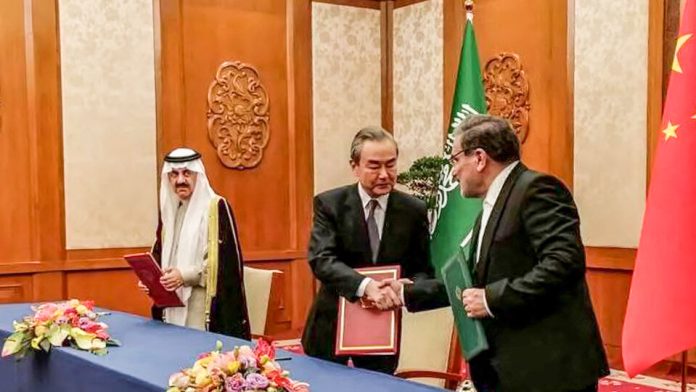The agreement between both regional powers has been produced under the auspices of China
Iran and Saudi Arabia have announced the reestablishment of their diplomatic relations, broken by Riyadh in 2016 after the assault on the Saudi Embassy in Tehran by an Iranian mob. «The Islamic Republic of Iran and the Kingdom of Saudi Arabia have decided to resume their diplomatic relations and reopen their embassies in two months,» reads the joint statement of the two great Shiite and Sunni powers, respectively, of the Middle East. China has joined the text, the country under whose auspices the thaw between countries has been signed. The confrontation of both States has had repercussions in the regional conflicts in Syria, Lebanon or Yemen.
The two countries have agreed to respect the sovereignty of States, not to interfere in internal affairs and to reactivate a security cooperation agreement signed on April 17, 2001, according to the joint communiqué, broadcast by state media, both Saudi and the Islamic Republic of Iran. The official Iranian agency IRNA also cites the resumption of a general agreement between the two territories, reached on May 27, 1998, «aimed at fostering ties in the economic, commercial, investment, technical, scientific, cultural, sports and youth».
Relations between the Saudi monarchy, which claims to be the leader of Sunni Islam, and the Iranian regime, which has become the champion of Shiite Islam, already dragged, before the break in 2016, a long history of rivalry. But they were completely interrupted earlier that year following the execution in the Saudi kingdom of Sheikh Nimr al-Nimr, considered the most influential cleric over the Shiite minority in that country, who had been sentenced to death for «terrorism». and «sedition.» Following his execution, a mob stormed and set fire to the Saudi Embassy in Tehran. Riyadh responded by withdrawing its ambassador, a move that was followed by the Iranians. Other Persian Gulf countries, such as the United Arab Emirates, Kuwait and Bahrain, have also cooled their diplomatic ties with Tehran to support Riyadh.
According to IRNA, Ali Shamkhani, secretary of Iran’s Supreme National Security Council, traveled to Beijing on Monday «for intensive negotiations with his Saudi counterpart in China aimed at finally resolving the differences between Tehran and Riyadh.» According to another Iranian outlet, the semi-official Tasnim agency, Shanjani had the Saudi National Security Adviser, Musaid Al Aiban, as an interlocutor.
«Relations between Tehran and Riyadh will lead to the development of regional stability and security and will increase cooperation between the countries of the Persian Gulf and the Islamic world to face existing challenges,» Shamjani declared after the signing of the agreement, according to television. Iranian official Presstv.
For his part, Foreign Minister Hosein Amir-Abdollahian celebrated in a tweet «the return to normal relations» between his country and Saudi Arabia, which, he stressed, offers «great opportunities for both countries, the region and the Muslim world.» Abdollahian added that his ministry «will actively launch other regional initiatives,» without elaborating.
The head of Iranian diplomacy and his Saudi counterpart, Faisal bin Farhan, are scheduled to hold a meeting in the coming days to discuss the reopening of their diplomatic headquarters and the accreditation of the new ambassadors, according to IRNA.
Since April 2021, Iraq had hosted a series of meetings between security officials from the two rival powers to bring the two countries closer. In their joint statement with China, Iran and Saudi Arabia «thank the Republic of Iraq and the Sultanate of Oman for hosting the talks between the two parties in 2021 and 2022, as well as the leaders and the Government of the People’s Republic of China for hosting and support the talks. The head of Chinese diplomacy, Wang Yi, has also congratulated himself on what he defined as the «victory of dialogue» between Saudi Arabia and Iran. He has also highlighted the «good faith» and «trust» that Beijing has brought to the agreement.
Regional reactions
Tehran and Riyadh support rival contenders in various conflicts in the region, especially those in Yemen, Lebanon and Syria. Iran has great influence in Iraq and Lebanon and militarily supports Bashar al-Assad’s regime in Syria and the Huthi in Yemen. Some of these regional players have reacted positively to the announcement of the reestablishment of relations, in certain cases with nuances. Hasan Nasrallah, leader of the powerful Lebanese armed group Hezbollah, has defined the news as «good progress», not without pointing out that his movement has «full confidence» that this rapprochement between the two countries will not come true «at their expense». in apparent allusion to the support he enjoys from Tehran.
Mohamed Abdulsalam, the chief negotiator for Yemen’s Huthi movement, which is also backed by Iran, has welcomed the deal. «The region needs the resumption of normal ties between its countries so that the Islamic nation recovers the security lost due to foreign interference,» he said.
The Qatari Prime Minister, Sheikh Hamad bin Jassim al Thani, who also acts as head of Foreign Affairs, has called, for his part, the foreign ministers of Iran and Saudi Arabia to congratulate them on their commitment to recover bilateral relations, while Anwar Gargash, diplomatic adviser to the president of the United Arab Emirates, has valued the pact in a tweet in which he affirms that his country welcomes the agreement «with satisfaction» and welcomes the role that China has played in it. Iraq’s state news agency has released a dispatch in which it assures that its country is pleased that Iran and Saudi Arabia have «turned the page», while the Egyptian Ministry of Foreign Affairs has expressed its hope that this commitment will help to reduce the regional tensions, with Bahrain and Turkey also welcoming the pact.



